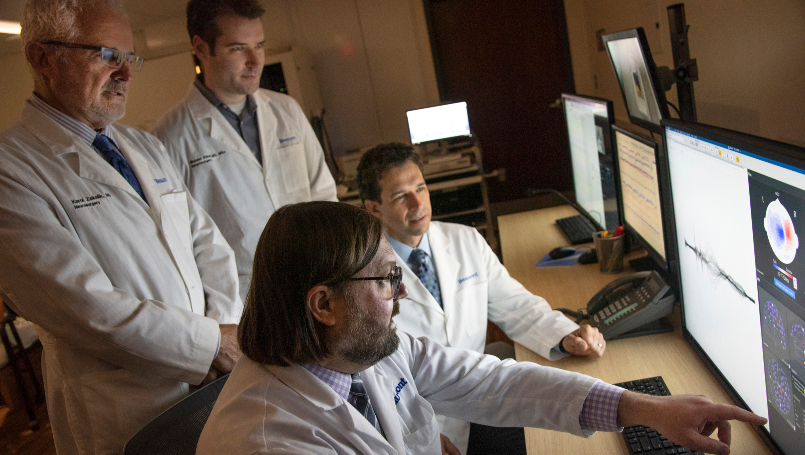Monday, July 12, 2021

World’s most advanced neuroimaging benefits patients with epilepsy
Epileptologists and neurosurgeons at Beaumont Hospital, Royal Oak, now have another hi-tech tool to diagnose and treat epilepsy and brain tumors called MEG.
Beaumont specialists recently began using one of the world’s most advanced neuroimaging technologies for mapping the brain of children and adults. The imaging is called magnetoencephalography, also known as MEG. The noninvasive technique measures and produces images of brain activity and function. It is used in diagnosing and pre-surgical planning for epilepsy and brain tumors.
MEG uses superconducting quantum interference device sensors to measure the weak magnetic fields generated by neurons in the brain. For those with epilepsy, a MEG scan can precisely pinpoint where their seizures occur with millimeter accuracy.
“It’s a more comprehensive way of looking at the brain,” said Dr. Andrew Zillgitt, director, Beaumont’s Level 4 Adult Epilepsy program and director of the Beaumont MEG program. “As medical technology continues to evolve, our new MEG system is another critical tool for diagnosing and treating epilepsy. MEG provides us more information, helping us decide whether surgery is a viable option and, if so, how to do the surgery in the safest manner possible for each individual patient.”

Dr. Daniel Arndt, chief, Pediatric Neurology and director, Pediatric Epilepsy Program, Beaumont, Royal Oak, added, “We’re pleased to be one of only three health systems in Michigan with MEG technology. This is huge for our patients and enhances the capabilities of our Level 4 pediatric epilepsy program.”
Dr. Zillgitt said, “It’s not new technology, but it is underutilized and still not widely available. There has been a lot of developments in MEG technology the past 20 years. Today’s systems are more advanced with user-friendly software.”
Beaumont’s MEG system, by Ricoh, is the first such system installed by the manufacturer in the U.S. Ricoh’s MEG technology originated in Japan.
Dr. Arndt said, “We can learn so much about a patient’s brain activity, specifically where motor, hearing, vision, sensory and language functions are located, all without surgery. Its ability to localize the origin of seizures helps us plan the placement of depth electrodes in the brain using ROSA robot technology in stereo-EEG evaluations for pediatric and adult epilepsy surgery candidates. From a parent’s or child’s perspective, the experience of getting a MEG scan is quiet, and unlike with MRIs, you’re not enclosed or confined, but out in the open. Importantly, just like MRI, the MEG is magnet-based technology, so there is no radiation exposure.”
Ongoing research with MEG involves other neurological conditions such as Alzheimer’s disease, dementia, autism, PTSD, depression, traumatic brain injury and ADHD.
Epilepsy is one of the most common neurological disorders. Abnormal electrical activity in the brain causes the disorder. Nearly 109,000 Michigan residents have epilepsy, including 13,600 children.One-third have drug-resistant epilepsy. For those, surgery may be a treatment option.
Both Beaumont’s pediatric and adult epilepsy programs have earned accreditation for the highest level of epilepsy care, Level 4, by the National Association of Epilepsy Centers. Beaumont, Royal Oak is also accredited by the American Clinical Magnetoencephalography Society as one of 22 MEG centers in the U.S. The hospital is also nationally ranked by US News & World Report as a top hospital in neurology and neurosurgery.
